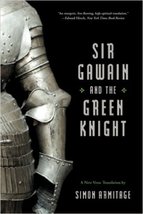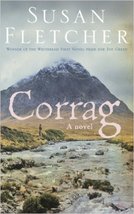The Green Knight, witchcraft, poetic language, and lots and lots of bad weather.
So the festival finishes and a new year follows
in eternal sequence, season by season.
After lavish Christmas come the lean days of Lent
when the flesh is tested with fish and simple food.
Then the world's weather wages war on winter:
cold shrinks earthward and the clouds climb;
sun-warmed, shimmering rain comes showering
onto meadows and fields where flowers unfurl;
woods and grounds wear a wardrobe of green;
birds burble with life and build busily
as summer spreads, settling on slopes as
it should.
Now every hedgerow brims
with blossom and with bud,
and lively songbirds sing
from lovely, leafy woods.
So summer comes in season with its subtle airs,
when the west wind sighs among shoots and seeds,
and those plants which flower and flourish are a pleasure
as their leaves let drip their drink of dew
and they sparkle and glitter when glanced by sunlight.
Then autumn arrives to harden the harvest
and with it comes a warning to ripen before winter.
The drying airs arrive, driving up dust
from the face of the earth to the heights of heaven,
and wild sky wrestles the sun with its winds,
and the leaves of the lime lay littered on the ground,
and grass that was green turns withered and gray.
Then all which had risen over-ripens and rots
and yesterday on yesterday the year dies away,
and winter returns, as is the way of the world
through time
At Michaelmas the moon
stands like the season's sign,
a warning to Gawain
to rouse himself and ride.
Still. Winters were best.
And they were hard ones in Thorneyburnbank. A duck froze on the burn -- it squawked until a fox came, and left its webbed feet in the ice. There were icicles we sucked, Cora and I. The millpond could be walked on, and once, a tree broke from all its snow and buried a cow -- they had to dig for it with spades and hands. All night long they dug, and the cow lowed so crossly that they did not hear the Mossmen taking horses from the forge. Also, one winter, there was a wooden box -- put beneath the yew tree, and not buried, for the ground was too dark, iron-hard. The box was broken by dogs and crows who knew meat when they neared it. Poor Widow Finton. But she was dead and never felt it. All things must eat.
That winter. That long, blue-lit winter that we moved through, her and I. She broke ice with her hooves. She crunched out over frosty fields and kicked snow up, and was very startled when a bough dropped its load on her back. She whinnied, charged away. I fell from her, into a drift, but the mare came back and sniffed about for me. I think she was sorry, for her ears were forwards. She always put her ears forwards when she was glad to see a thing.
I sucked icicles. I saw some eerie, moonlit nights. Sometimes the sky was so clear that I put my cloak across her back as she slept -- for she felt the cold more than I. She was foaled in the summer, long ago.
We rode through old reiver valleys.
Drank from moats of castles.
And we moved mostly at night, for these are the emptier times. I said north-and-west, in her ears, and we set out under the stars. We trod carefully in dank places. We held our breath in them -- for what else lurks in such dankness? Not much that's good, I thought. But we galloped, too -- out over the open, snow-covered wastes, and the drifty valleys, and under bare trees. She liked it.
Cora had promised me that beauty was in differences, in the sights that most folk did not like, or were fearful of -- she'd said for are not all other things very dull?
And as I rode out across Rannoch Moor, I thought of her. She would have danced in it. She'd have lain down and clutched the peat, pressed it to her face. She'd have plunged her red skirts into the lochs, and tugged up the reeds, and chased the deer with her arms stretched out -- for here was her soul's home. No people. For people said witch, and tied thumbs to toes. Here, there were pools so still that there was a second sky in them, and a lone bird skimmed the water so that there were two birds. When there was wind, it rattled the heather. It came about the boulders and the sides of hills like water -- shaking itself, shrill, almost white. It whistled through the cattle skulls, and my hair beat itself like a wing on my cheek, saying fly fly fly and when the wind moved away again, I heard bees. I heard the soft tread of deer, and their teeth on the grass, and I liked them. I liked their reddish, thick bodies, and their crowns on their heads like they were the true kings of the world -- not a wheezy Dutchman. Not a Stuart hiding in France.
I heard the lap lap of loch water, and the puck fish made with their mouths.
North-and-west, always. And I nudged the mare on. she felt the wind in her half-tail, and went.
Those winter nights. I'd look out at the huge sides of snowy rocks which grew about me, and I'd see their eerie colours -- grey, black, blue. Then I would go inside, where my fire spoke to itself. But still, I felt them looking down on me. I could feel their height, and darkness. I thought of their age, of what they had seen, and as I tucked up by my fire I thought they glow . . . Like living things. Their frost glinted on me, and their breath was icy-cold.
Some people hate such thoughts. They stay away from mountains like mountains mean them harm. But what I say to myself when I see a mountain or a starry sky, or any natural thing which feels too much to bear, is what made this, made me, too. I am as special. We are made by the same thing . . . Call it God, if you wish. Call it chance, or nature -- it does not matter. Both the mountains of Glencoe and me are real, and here. Both the moon which is full tonight and you, Mr. Leslie, are here, and shining.
----------------
This was winter then -- my season. My weather. And what a wild, Highland winter that one was. Ice creaked, and the flakes of proper snow did not fall, at first -- they hung, mid-air. They drifted about my head as I walked back from the glen, with peat in my arms. When I saw myself in darkened pools I saw my snowy hair.
Seeing it, I thought this is the start.
It was. These thin flurries did not last. Five days after Hogmanay, a wind blew in. It threw snow against the northern ridge, and howled up into my valley so that my roof shook. skies swelled and raced, like sea-skies do. And I wandered -- for wasn't winter always too magick to go unseen? I had never feared it. So I wandered where I knew there would be beauty -- to half-frozen water, or to the heights where deer were. They sat against rocks, blinked in the wind. I saw a white hare running -- so fast and snow-coloured it was like wind, or a flurry of flakes, and only its black eye and the pads of its feet showed it was not these things. A snow-hare . . . I had never seen one. I looked at its tracks when it was gone. I was spun in the wind when I crested peaks, and when I lay down I caught flakes on my tongue. These things. Small, and safe things.
But in time, there was less snow. Slowly, there became more water noises, and the falling burn in my valley grew loud, and strong. I drank from it -- not on my knees, or with cupped hands, but by clutching a rock, leaning in and opening my mouth. I smiled as I drank. I tasted old winter. I drank new spring.
Day by day, green shoots showed themselves. The snow grew dimpled and up they came -- comfrey, and motherwort. To see them was like seeing friends again. I crouched to them, thought who needs people? People aren't always like this -- by which I meant meek, and kind, and soft to touch. I gathered them, dried them. Or I powdered them up, or put them in salt. Or I let them grow on, in the earth.


 RSS Feed
RSS Feed




